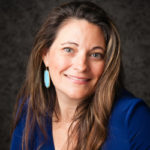Director of Publishing, American Anthropological Association

Please tell us a bit about yourself (e.g. hometown, current locale, course of study).
I’ve lived in Maryland most of my life, with stints in DC and Boston. I grew up in a small town on the “northern part of the Eastern Shore” on the Maryland-Delaware border, right down the street from the University of Delaware. I’m still in Maryland, this time on the DC border, in Chevy Chase. I, not surprisingly, went to the University of Maryland and received degrees in English and Women’s Studies. I had every intention of becoming a professor but dropped out of grad school during the first semester.
Right now, I live with my partner and my daughter, who just started high school. We also have three cats.
Describe some of your current responsibilities, and what type of organization you belong to.
Right now, I oversee the publishing program at a social science academic association. My days are varied, which makes the job interesting and fun. We have a portfolio of more than 20 journals that span the discipline, the award-winning bimonthly member magazine Anthropology News, a small books series that is getting ready to expand, and an open access research repository/preprint server. I work with a great group of people, with about 20 of us on staff and three dedicated solely to publishing.
What was your first scholarly publishing role? How did you get that job? What path led to your current position?
I was trying to move to Boston in my mid-twenties and applying for any position that had the word “edit” or “editor” in the ad. I wound up as a copyeditor at an organization that used journal articles and package inserts for pharmaceuticals to make training materials for sales reps. I lasted about a year and then moved to a managing editor position for a small medical journal. THAT was really my first taste of scholarly publishing—I managed the peer review process, the editing, and the layout. I was there for almost five years and only left because I wanted to move back to the DC area.
If there was a pivotal moment or key person in your career development, please describe briefly.
In late 2007/early 2008, I was having a hard time at work and looking to move. I applied for and accepted a journals manager position at a (different) social science nonprofit as they were getting ready to move from self-publishing to seeking out a commercial publisher. I saw how the relationship between society and publisher can grow and that it really is a partnership between both parties. I learned a lot about the way editorial offices within academic institutions operate (my previous positions housed editorial offices internally) and how all of the parts/staff of an association work together. I was in that position for almost seven years but the first two years were really eye-opening.
What tools, websites, and organizations do you find most valuable for your career development?
The Scholarly Kitchen and Inside Higher Ed are daily reads and I also keep up with the Washington Post and occasionally the New York Times. The Chicago Manual of Style published a weekly email with answers to style and grammar queries that I loved to get and pre-pandemic served as conversation fodder with my teammates.
What are some of the surprises/obstacles that you’ve encountered during your career?
That what we do as scholarly publishing professionals is really unknown outside of our industry. Most people I meet socially think I’m either an editor or a writer.
What do you wish you knew more about?
As much as I try to keep up, the different ways libraries use resources toward publishing. What percentage is for traditional subscriptions? What is for APCs? How do transformative arrangements break down percentagewise between these two business models? Where does the subscribe-to-open model fall in here? What is the staying power of any of these models?
What advice would you give to people interested in a career in scholarly communications?
Don’t be afraid to work across the field—being a peer-review manager, then working on production, and then as a managing editor or copyeditor can really make you a well-rounded candidate who is familiar with the full workflow that happens in academic publishing. You’re aware of the challenges that any of these might face at any given time (who hasn’t had to chase a non-responsive author for proof corrections for an issue that’s already late?).

